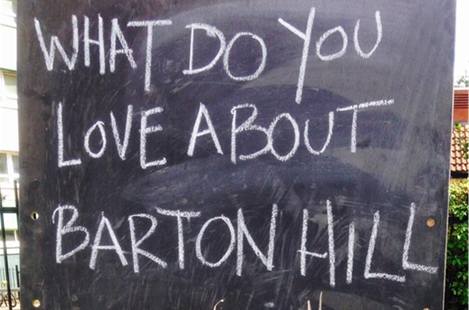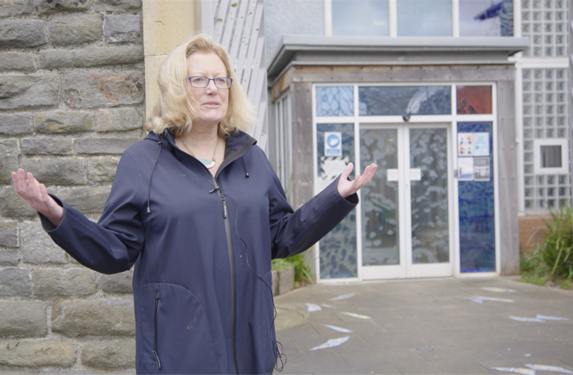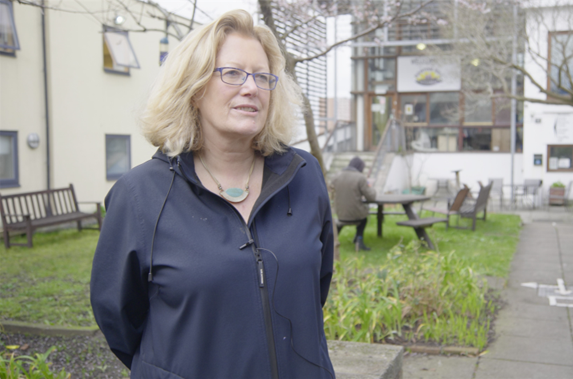Coffee with Joanna. A new era for Wellspring Settlement.
The times they are a changing! As two well known local organisations , Barton Hill Settlement and Wellspring Healthy Living Centre, have merged together to form the Wellspring Settlement we sat down for a cup of coffee and a chat with its new CEO Joanna Holmes. Discussing key challenges, successes and what the future looks like.
Hi Joanna, thanks for joining us and having a chat today.
No problem, have been looking forward to it.
You are the new CEO of the Wellspring Settlement, how long have you been in your new current position?
Since April. I was the former head of Barton Hill Settlement, until we merged with Wellspring in February 2020.
Why did you merge?
The thinking behind it was that we were two reasonably sized organisations in close proximity to each other. We felt that austerity measures were going to make things tough for the area and it needed a very strong organisation that could weather the storm. I suppose, for this part of the city to have a stronger united stand we could have more influence and engage better with lots of different providers.
How did you start working in the area?
Well, I was CEO at the Barton Hill Settlement for around 15 years perhaps. But my first involvement is a very long time ago, it’s hard to remember the exact time I started working here, it’s at least 25 years. But even before then I was bringing my children to the Family Centre when they were little, then I started volunteering. Then I had a part-time job and I’ve since had several other jobs until my current role.
What geographical area does the organisation cover?
Nearly all of the work covers at least the Lawrence Hill ward, from Barton Hill to Redfield to the Dings and more, but increasingly significant amounts of it cover the whole of the Inner City and East area.
Give me a flavour of some of that work that goes on.
We deliver some work directly, and some organisations are tenants from our two sites.
So, we have Social Prescribers who are based in all of the Inner City and East GP practices, working with people referred by their GPs. We’ve got a Family Centre that provides activities and all sorts of support to local families, about 900. We work with people to help them gain employment if they’ve been out of work for a long period of time. We work with people to sort out their finances. We also offer what’s called a MSK clinic. So quite a range really.
So on the tenants part, local people and organisations can get a reasonable cost for a range of services, not just ones you deliver?
Yes, that’s an important part of our role, offering affordable rates for local community organisations. These include a theatre company, the Somali Resource Centre, a South Asian centre called Dhek Bhal who are one of our oldest tenants, Bristol Refugee Rights, the Barton Hill GP practice, the CAMS team, and lots more besides. Forgive me if I haven’t listed all!
What is unique about Barton Hill and the surrounding area for you?
I’ve always loved this area because I think you get a really good mix of people who are always busy, doing a whole lot of things. I love the way that people really want the best for their children.
And we try really hard to provide that I think. Lots of ways that people can connect with each other. And that’s been also during Covid when it was made really difficult, but one of the main things is that people do get involved in things in the community and join in. And I love that.
I guess the facilities are a kind of a meeting place, a hub where people can communicate together. And Covid has made many of us even more aware of the need for this.
I think the key challenges for people have been all of the underlying factors that were there before Covid anyway.
And Covid has just made that worse, amplified it. The fact that an awful lot of people live in accommodation that’s overcrowded and often unsuitable is difficult. The fact that the work they do for the money they get doesn’t always quite cover living costs. That outgoings are high at a time when people are under a lot of stress and under a lot of pressure. And there’s no doubt that people’s mental health has suffered.
So Covid has made people feel much more isolated and obviously some people are more isolated than others. But what is good about this community is that there have been lots of ways people can connect with each other – and even though it was particularly tough we still managed to keep a relationship there.
What would you describe as unique about the Lawrence Hill ward?
One is the location. It’s really, really close to all the main things that go on in the city. So, like the Temple Quarter development, it’s really close to us. Cabot Circus, that’s also really close.
And the issue is whether people in this area get any benefit whatsoever from things like that. All of those major developments that we are so very close to, we can see them, but we don’t necessarily get any benefit from.
It’s very different from somebody who lives in one of the other estates in Southmead or Hartcliffe where you feel quite geographically isolated from the affluent parts of the city. We feel close to it, but in many ways a million miles away.
I mean, look out of windows now and you’ll see all the cranes where the developments are happening. But unless you have a job like driving taxis, the development probably won’t give you a reason to leave the area, any more than if you lived in Hartcliffe.
Is it partly your role and the role of your organisation to be the bridge, to make sure people are more connected?
Well, we do try and make that those mainstream experiences more accessible yes, I think it’s a really important part of the role. So on one level pre Covid, a lot of the things we would do would be trips and activities, so people actually did visit other places and broaden their experience of the city and surrounding area.
This could be just an away day to the seaside, that sort of thing. But I also think increasingly now, especially with the temple court development, it’s about us making connections with larger institutions. Like a major bank, like the university, so we can have longer term discussions about how to make sure the people in this area can benefit.
Wellspring Settlement can then play a vital role to lobby and advocate for greater access, and also help these organisations reach out beyond their bubble more?
Yes. An example of that is a project we’ve been doing recently with Bristol University and others to look at what are the experiences and the reality of people working in this area, and who are the major employers. Doing an exercise to get the two groups properly talking to each other.
This will help employers directly understand what the potential is to employ very highly trained and experienced people from this area who might not have the relevant qualifications, but can do the job. We want employers to be interested, actively try and recruit in areas like ours, and local people to start to see this as a possibility.
So you are brokering relationships. And I guess doing this in partnership with other community organisations in the city is key?
Yes. I think one of the great things is that across Bristol, is that there are lots of organisations that do similar work to us, like Southmead Development Trust or Hartcliffe and Withywood Partnership. And it’s really important to us that we work collaboratively with those organisations, because whilst our communities might be different, there are a lot of similar issues and challenges. And a united voice is a more powerful voice for people to start to listen and take action.
What would those issues be?
I think the main issues are probably in every sphere of life to be honest. So things like health, employment, economics – simply not having enough money to pay bills, financial issues. We have this in common.
Yet Bristol is one of the wealthiest cities in the UK, and also according to the Runnymede Trust one of those with the biggest inequality gaps too.
It does. And it’s a scam because although I completely understand the budget issues the Council has got, it’s still a very rich city, so surely we can do better? So let’s explore that a little bit. Cause it’s a bit of a tale of two cities at the moment, isn’t it?
One of the things we’ve been talking to Bristol University about and having some very fruitful discussions is how, as communities like here, and like in Southmead or Hartcliffe, we can provide the data that starts to set the policy for the Council. Because I think, the similarities and differences between areas like us and like Southmead should be informing how the city, tries to do things differently. How it sets policies and makes decisions.
There are often loads of assumptions. So, it’s what lens you look at things from, and whether we are getting enough real life experiences reflected in these decisions. Approach it in a more human way. Then better policy follows.
Is there a little bit of culture of people and communities being seen as a problem or needing funding for a problem?
At times, yes. But I think there’s now a recognition across the board that we should look at people as whole, good and bad. But you need to have direct conversations with families, because without that how do you really know what goes on?

So the role of community organisations that are embedded in communities is crucial to creating policy change?
Absolutely. I think we absolutely have to be right in the mix ourselves, we can never do that enough and we can never provide enough. And it’s ever-evolving. Nothing stands still. So its our duty to inform the authorities and policy makers in the city about what’s happening on the ground. Because we are the ones that truly know and have these relationships.
Sure, and you are always on the side of the community?
Well we are only here, and our entire constitution as an independent organisation is to work alongside this community, to be a part of it and advocate. Because it’s about power isn’t it? If you always feel done to, you feel powerless. If you feel connected within your community and to your communities, and some is representing you, then you feel like you have more power.
And sometimes it’s more appropriate for us to take on a battle for a key local issue than it is for residents, because it can be very difficult for individuals to do that. Whereas as an organization, a collective, we have those links and contacts and can do that alongside them.
So you also have a new website, why?
We wanted a new website because previously we were working with the two websites from the two organisations, and better to have one now we have merged. It’s really important to that we have a website that people can use and understand in a really easy way. So they can find out any information they want.
We have designed it to be as useful as possible for people in the community. It’s not fully finished yet, and we will keep improving it, but hopefully it’s an additional way for people to engage with us.
Also, alongside social media, you want to tell more local stories on the website too?
Yeah, I think it’s really important that we do that, but in a real way, not in an idealistic way. So it tells real stories of people’s lives, for many of the reasons we have spoken about. So people understand what goes on.
The stories we tell about this area are always different from any imagined story that people might have in their heads. And to be honest they are always much better. We want to celebrate success, celebrate stories of resilience, but also to reflect challenges, and raise the voice of groups of people while we do that.
You also want residents directly contributing too, so there is an opportunity for them to tell their own stories directly?
Absolutely. I think that’s important. Hearing direct.
Also traditional websites are often just about information, which is great and people need to know what’s going, but its more than a notice board. Modern communication is more interactive, and building an online community. We want to showcase things that are happening, in a variety of different ways. And we look forward to doing that, from articles to videos to podcasts and more.
What is new and exciting for the organisation in 2022?
Many more events and activities are coming this year, particularly in the summer. Plus we’re going to be having regular open days so that people can come in to sign up to things, to find out about what they can get involved in their area. It’s been a challenging couple of years for everyone, but fingers crossed we are emerging from the worst now, and we have contingency plans in place regardless. But am excited for the future of the Wellspring Settlement, we have some new roles, and projects on horizon and am very much looking forward to seeing what can be achieved together.


